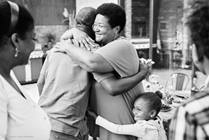Search Results
Viewing: 321-330 of 336 | All

Condition
Dehydration
There are many reasons why children can get dried out or dehydrated. A child can lose too much liquid from the body from diarrhea, vomiting or fever. If the child has mouth sores or a bellyache, they may refuse to drink enough. Babies and younger children are at greater risk.

Blog
How to Have a Safe Holiday
The holiday season is upon us and many families are getting into the holiday spirit. It is easy to get caught up in the excitement and not realize the potential injury risks some of these activities can have. Learn how to prevent them.
Article
Dental: Oral Sedation
Sedation can help your child feel less anxious, nervous or afraid, be more comfortable and stay still during the procedure.

Blog
How to Talk with Your Kids About Puberty
When kids are toddlers or preschoolers, they start asking questions about their bodies – and even yours. If you start early and talk to them often, then talking about puberty when they get older will be a lot easier.
Article
Letters from Leadership
We are so glad you are interested in our General Pediatrics Residency program. We encourage you to take a moment to read messages from our pediatrics chair, program director and 2024-2025 chief residents, all of whom share a little more about residency life, training and the possibilities open to
Article
Seizure Information for Parents
Your child had a seizure. What do you do now? Learn more about safety, treatment and tips on living with seizures and epilepsy.
Hemophilia
Hemophilia is an inherited blood disorder. In hemophilia, a blood clotting factor is missing. In Hemophilia A, Factor VIII (8) is missing. In Hemophilia B, Factor IX (9) is missing. Without these factors, blood will not clot well. People with hemophilia are born with the disorder. It is not contagious.

Specialty
Neurogastroenterology and Motility Disorders Center
Neurogastroenterology and Motility Disorders Center guides families through the challenges of GI motility disorders with expert care and answers that make a difference.
Article
Nasogastric Tubes (Insertion and Feeding)
Feeding tubes are often used for babies and young children who are not able to take in enough calories by mouth. If the tube is placed through the nose into the stomach, it is called a nasogastric tube (NG tube).
Article
Cecostomy Tube
A cecostomy tube is also called a C-tube. It is a non-latex tube or catheter placed in the first part of the large intestine, also called the cecum. A procedure called an irrigation is done to provide a comfortable, convenient way to clean out the bowel.
